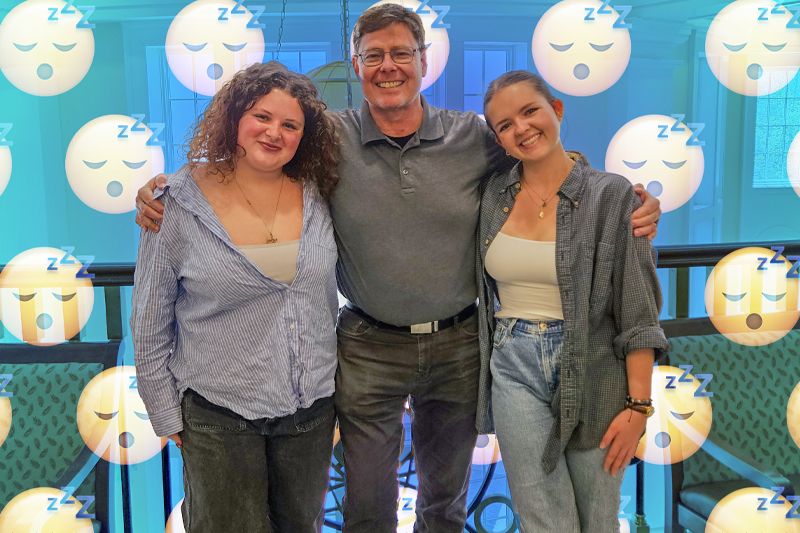
Read time:
As Dr. Jeff Gibbons was listening to his teenage son talk about how sleep deprivation powered a friend’s courage to ask a girl out, he found himself going into full professor mode.
“Could that be true?” the Psychology professor asked himself.
He then did what many college educators would do – he launched a research project to find the answer. To help him in his quest, he called on Brenna McManus and Ella White, both students in his Psychology lab.
The students sent out surveys to 250 participants on campus, asking them about their sleep habits, anxiety/fear, and quality of sleep. The survey and then multiple follow ups targeted six measures of courage. They wanted to know whether a lack of Zs and high anxiety energized their ability to do things they normally wouldn’t do, like muster the courage to ask someone out. Over time, they took a hard look at the impact of participants’ poor sleep and fear/anxiety on their actions and thinking patterns. They also discovered valuable insight into their own lives.
The study proved that yes, there is a link between too little sleep and decisions that would otherwise be too anxiety-inducing to make. The more tired people are, the more apt they are to take behavioral risks. It is the first study to show that high levels of both poor sleep and fear/anxiety lead to an elevation in courage.
The results of the research were published in Research Gate and also presented at the Southeastern Psychology Association Conference. The team recently received word that the research will also be published in the Journal of Behavioral Science.
The project was one of eight research projects that Gibbons’ lab conducts each year.
For McManus,’ 26 Psychology, and White, ‘25 Psychology, the experience has proven invaluable – they’ve gained important research experience that will set them up for success when they venture into the real world.
Undergraduate research is one of the four pillars of a CNU education. An important component of the University's research focus is the Summer Scholars program, which pairs students with faculty to conduct meaningful research over the summer.
“Students come here because they can do undergraduate research. It’s an important part of what we do,” Gibbons said.
McManus and White found the sleep/courage research to be enlightening and rewarding. Both have used the opportunity as a springboard to determine what they want to do upon graduating.
They also have taken the results to heart, both changing their collegiate sleep habits and preaching the importance of a good night’s rest to their peers in order to avoid engaging in risky behavior or acting too courageously.
“It’s common knowledge that sleep is beneficial, but with decision making now coming into play, I definitely think more about my sleep,” White said.
McManus said that she used to function on less than five hours of sleep. Not anymore. The study woke her up, so to speak, to the need for rest.
“I can’t say that I necessarily listened to others saying I needed to get more sleep when I was in the thick of it, but now that I know better, I will always try to pass down that message,” she said.
White and McManus, the lead on the sleep deprivation study, joined Dr. Gibbons’ lab in the fall of 2022 and have since worked on several research projects. For McManus, seeing her name on the published paper was surreal.
“I am a 20 year old who has been published, which is just wild to me,” said McManus, who intends to pursue her doctorate in educational psychology and focus on effectively teaching students to read. “I didn’t know this was possible. It’s an honor to be able to present myself in this way.”
Being able to be part of Dr. Gibbons’ lab, White said, showed her what was possible and also introduced her to topics and research that ignited excitement about her studies.
“The research has informed my CNU experience by allowing me to work collaboratively with others in a way that I haven’t been able to before,” said White, who hopes to pursue a doctorate in quantitative psychology. “Without this research, I would not have been able to find my passion for the field and allow myself to grow within it.”